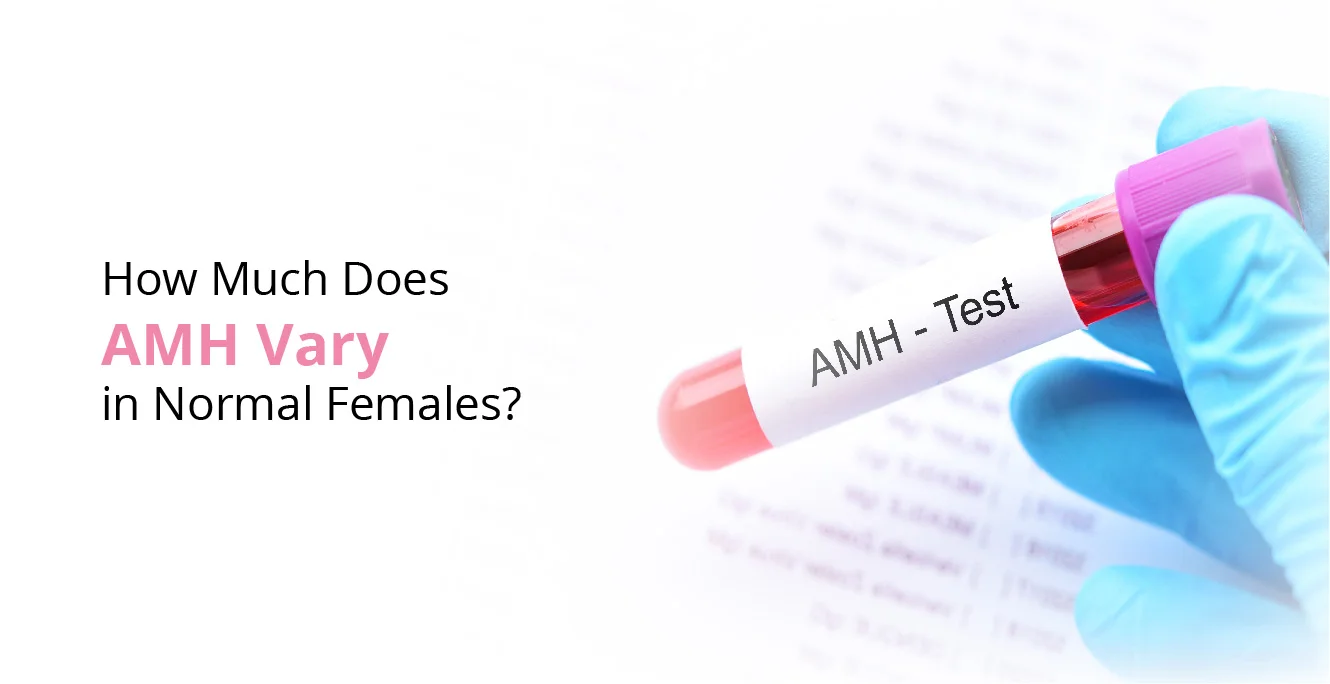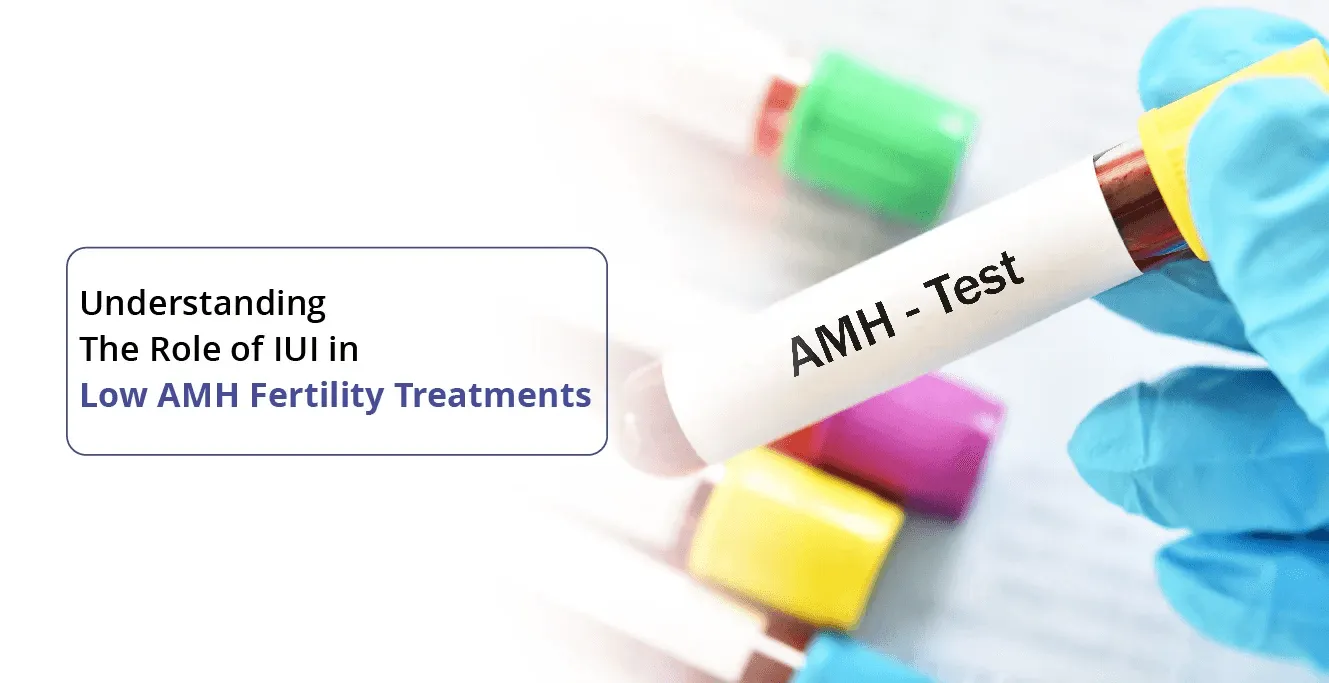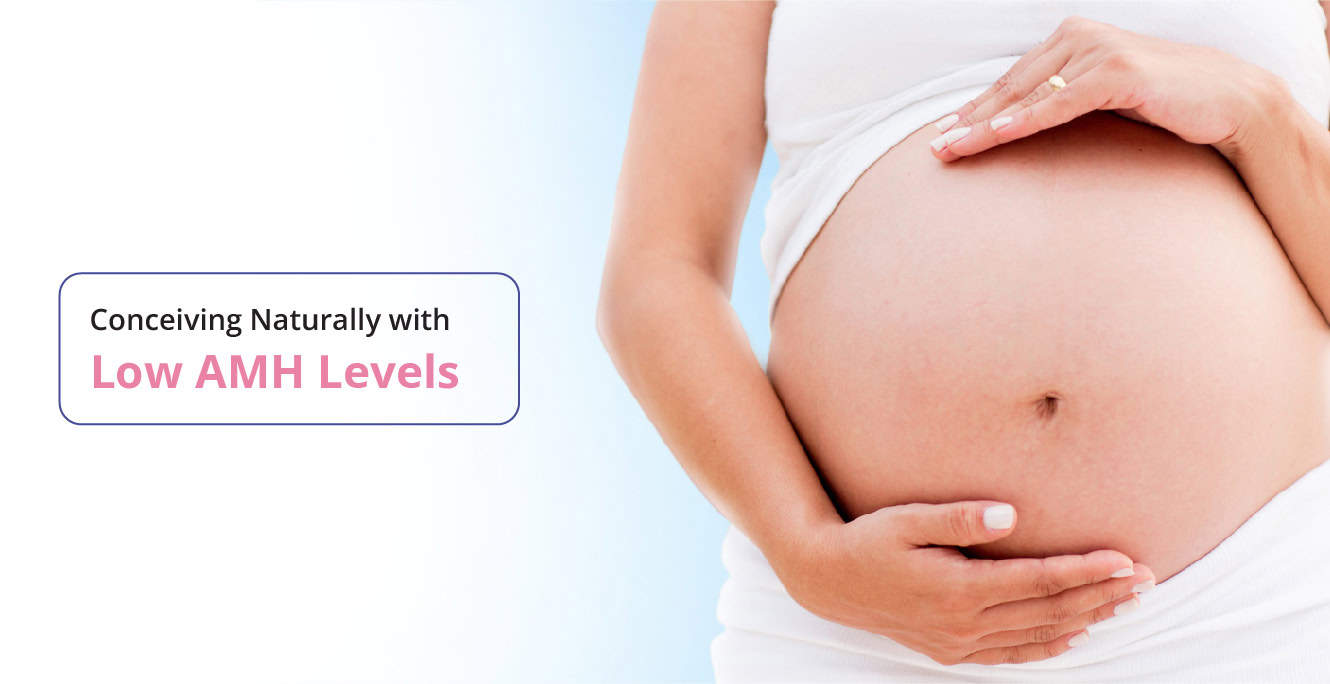
Low AMH Levels: Impact on Fertility and Treatment Options

Table of Contents
- Key Takeaways
- AMH Value for Pregnancy
- What Do Low AMH Levels Mean?
- Types of Low AMH Levels
- Understanding the Causes of Low AMH Levels
- Recognising the Symptoms of Low AMH Levels
Key Takeaways
- Low Anti-Müllerian Hormone (AMH) levels indicate a reduced ovarian reserve, which can lower the chances of conception.
- Low AMH does not directly cause infertility, it can hinder the release of mature, healthy eggs, making it more challenging to achieve pregnancy.
- Low AMH can be diagnosed through a simple blood test.
- Age significantly affects AMH levels, with other factors like stress and genetics also playing a role.
- Despite challenges, informed treatment planning and counselling can help navigate their fertility journey.
Anti-Müllerian Hormone (AMH) is produced by ovarian follicles. It is a key indicator of a woman’s ovarian reserve i.e. the number of viable eggs remaining. It is natural to get concerned if you have been diagnosed with low levels of AMH as this can affect fertility. But here is the good news: Although low levels of AMH may pose challenges in getting pregnant, it does not make it impossible. With the right treatments and support, many women with low AMH can still achieve successful pregnancies. Let us understand how.
AMH Value for Pregnancy
Below are some general guidelines regarding AMH levels and their implications for pregnancy potential.
|
AMH Level (ng/ml) |
Pregnancy Potential |
|---|---|
|
Over 1.0 |
Good |
| 0.7 – 0.9 |
Fair |
| 0.3 – 0.6 |
Diminished |
|
Less than 0.3 |
Very low |
However, these are just averages—successful pregnancies have occurred even with very low AMH. Your doctor can provide a more personalised assessment based on your unique circumstances.
What Do Low AMH Levels Mean?
Low AMH levels indicate a diminished ovarian reserve, meaning fewer eggs are available for fertilisation. Normal AMH levels range from 1 to 4 ng/ml. Levels below 1 ng/ml are considered low.
Although low AMH can complicate conception, it does not equate to infertility, as various other factors—including egg quality and overall health—also influence fertility. Testing AMH levels can provide valuable insights into fertility potential and help decide treatment options.
Types of Low AMH Levels
Low AMH levels can be categorised based on severity and age of onset.
Severity
Low AMH levels can be categorised into three types based on severity:
|
Severity |
AMH Levels |
Implications |
|
Below 1 ng/mL |
A reduced number of eggs available for conception, potentially affecting fertility |
|
|
Very Low AMH |
Below 0.5 ng/mL |
A significantly reduced ovarian reserve, often necessitating advanced fertility treatments |
|
Ultra low AMH |
Below 0.16 ng/mL |
An extremely low ovarian reserve, commonly associated with substantial fertility challenges and lower chances of successful conception |
Age of Onset
Based on the age of onset, low AMH levels can be categorised into the following types:
|
Condition |
Description |
|
Age-related low AMH |
AMH levels naturally decline with age due to the depletion of ovarian follicles, a normal part of reproductive ageing. |
|
Premature ovarian failure (POF) |
Occurs in women under 40 with low AMH levels, indicating a premature loss of ovarian function that may lead to infertility. |
Understanding the Causes of Low AMH Levels
Several factors can contribute to low AMH levels, including:
| Factor | How Does it Impact? |
| Age |
|
| Genetic Factors |
|
| Autoimmune Diseases |
|
| PCOS |
|
| Premature Ovarian Insufficiency |
|
| Thyroid Disorders |
|
| Lifestyle Factors |
|
| Cancer Treatment or Chemotherapy |
|
| Surgical Procedures |
|
| Environmental Factors |
|
Recognising the Symptoms of Low AMH Levels
While low AMH itself doesn’t present with specific symptoms, it’s often associated with:
- Irregular Menstrual Cycles: Women may experience changes in their menstrual cycles, including duration and variations in blood flow, a sign of hormonal imbalances.
- Changes in Ovulation: Some women might observe changes in ovulation patterns, which can manifest as irregular ovulation or anovulation (lack of ovulation).
- Early Menopause: Some women with low AMH may enter menopause earlier than expected, which can significantly affect fertility and overall health.
- Difficulty Conceiving: Low AMH levels are linked to a reduced number of available eggs, making conception more challenging and potentially leading to infertility or subfertility.
- Reduced Egg Quality: Women with low AMH may face a decline in egg quality, increasing the risk of miscarriage and chromosomal abnormalities.
- Elevated Follicle-Stimulating Hormone (FSH) Levels: Low AMH can lead to higher FSH levels as the body attempts to stimulate the ovaries to produce more eggs.
- Infertility: This is the most significant indicator. It is often noticed after attempting to conceive without success.
- Increased Risk of Pregnancy Complications: Lower egg quality and reduced ovarian reserve can lead to complications during pregnancy.
- Poor Response to Ovarian Stimulation: In fertility treatments like IVF, women with low AMH may not respond well to ovarian stimulation, resulting in fewer eggs being produced.
- Vaginal Dryness: This can occur due to hormonal fluctuations associated with low AMH levels.
While these symptoms can indicate low AMH levels, they are not definitive. Women experiencing any of these symptoms should consult a doctor for further evaluation and potential testing.
Do Low AMH Levels Affect Fertility?
Yes, low AMH is a strong indicator of reduced ovarian reserve and can significantly affect fertility by:
-
Reducing egg quantity and quality
-
Increasing the risk of miscarriage, especially combined with advanced maternal age
-
Complicating conception efforts, including lower IVF success rates
Diagnosing AMH Levels: Testing Methods and What the Values Mean
If you’re having difficulty conceiving, your doctor might suggest tests to assess your AMH levels and overall ovarian reserve. Low AMH can be detected through a blood test that measures the level of AMH in your body. For an accurate assessment of ovarian reserve, this test is usually conducted on specific days of your menstrual cycle.
Indication of results
|
AMH level (ng/mL) |
Ovarian reserve |
|---|---|
| >1.5 |
Normal |
| 1.0-1.5 |
Low normal |
| 0.5-1.0 |
Low |
| <0.5 |
Very low or ultralow |
Fertility Treatments for Low AMH Levels
Despite challenges, women with very low AMH levels still have reasonable chances of achieving a pregnancy. Here are some of the fertility treatment options available:
-
In Vitro Fertilisation (IVF): IVF is considered the gold standard treatment for low ovarian reserve. It involves stimulating the ovaries to produce multiple eggs, which are then retrieved and fertilised in the lab. Despite low AMH, IVF can still be effective, though success rates decrease with age. There are two types of IVF protocols:
-
Standard IVF: Traditional IVF protocol.
-
Natural IVF or Mini Stim IVF: Lower-cost options with reduced medication, often preferred by women with very low AMH levels.
-
-
Donor Eggs: For those with extremely low AMH who are older or have poor IVF responses, using donor eggs can significantly improve pregnancy rates. This option bypasses the issue of limited or poor-quality eggs from the woman’s ovaries.
-
Intrauterine Insemination (IUI): IUI involves placing sperm directly into the uterus around ovulation. While typically less effective than IVF for women with low AMH, it is a less invasive and more affordable option that may still yield positive results for some.
-
Ovarian rejuvenation with PRP: Platelet-rich plasma (PRP) therapy has been explored as a potential method to improve ovarian function, although its effectiveness is still under investigation.
-
Ovulation Induction: Medications can be used to stimulate the ovaries to produce more eggs during the menstrual cycle, increasing the chances of conception.
- Egg Freezing: An increasingly popular option in fertility preservation, egg freezing involves stimulating the ovaries with hormones to produce several mature eggs. These eggs are then collected and frozen for future use. This procedure offers an opportunity to preserve fertility before further decline in egg count.
- Embryo Freezing: This is a variant of IVF where the embryos (fertilised eggs) are frozen for future pregnancy. This ensures that even if your egg count declines further, you will have embryos ready when you decide to conceive in future.
Consulting fertility specialists is crucial for a tailored treatment plan and optimal outcomes.
Did you know?
A study involving 448 IVF cycles in 361 women with AMH levels below 0.5 ng/mL showed that age significantly affected success rates, but even older women could achieve pregnancies.
How Do I Maintain AMH Levels?
While there are no medications to increase the number of eggs in your ovaries, several lifestyle and natural treatments can help improve egg quality and quantity:
| Things that Can Help | How? |
| Balanced Diet |
|
| Yoga and Regular Exercise
|
|
| Acupuncture |
|
| Dehydroepiandrosterone (DHEA) Supplements |
|
| Avoid Environmental Toxins: |
|
FAQs:
How Often Should AMH Levels Be Tested?
The frequency of AMH testing depends on individual circumstances. Generally, it’s advisable to discuss testing frequency with a fertility expert.
Are There Any Potential Side Effects of Fertility Treatments for Low AMH?
Fertility treatments like IVF or egg freezing may result in mild discomfort, bloating, and mood swings. In rare cases, ovarian hyperstimulation syndrome (OHSS) can occur. Discussing these potential side effects with your doctor is crucial to understanding individual risks.
How Does Low AMH Affect Natural Conception, and When Should One Seek Fertility Assistance?
If conception challenges persist after six months of active trying, especially for women over 35, seeking fertility assistance is recommended for timely interventions.
Word from the Experts:
For women facing the challenges of low AMH levels, it’s essential to remember that there is still hope for achieving pregnancy. While the journey may be more difficult, advances in assisted reproductive technologies have made it possible for many women with diminished ovarian reserve to become mothers. The key is to work closely with a trusted fertility specialist who can guide you through the process and help you explore all available options.~ Dr. Prachi Banera
Our Fertility Specialists
Related Blogs
To know more
Birla Fertility & IVF aims at transforming the future of fertility globally, through outstanding clinical outcomes, research, innovation and compassionate care.
Had an IVF Failure?
Talk to our fertility experts

 Our Centers
Our Centers














